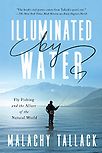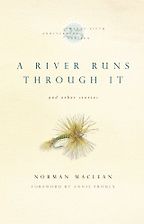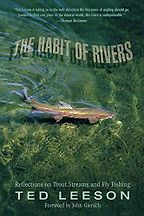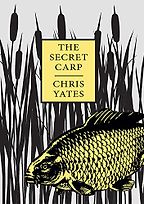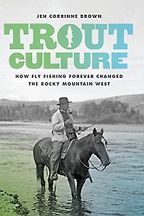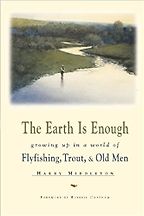What do you look for in a book about fishing?
I’ve been reading about fishing for as long as I’ve been fishing, which is 35 years now. It’s a way to extend an experience that always feels too short. To begin with, I was pretty indiscriminate about it. I read anything and everything I could, from how-to magazines to illustrated books for young people, to The Compleat Angler by Izaak Walton.
These days, I’ll still occasionally go on a reading binge—most often in the winter, when I’m spending too much time indoors. But there are a lot of mediocre fishing books out there, and sooner or later I’ll throw one down in frustration and that’ll be that.
What I’m looking for, now, is what I look for in almost any book: good writing. I want writing that can make this activity, which is so completely familiar to me, feel fresh. I want writing that asks interesting questions, or that overturns previously-held assumptions, or that vividly translates places and experiences into words, or that makes me want to rush outside to find the nearest piece of water. Those books are harder to find.
You discuss your “identity as an angler” in your memoir Illuminated by Water; what does it mean to be an angler—what draws anglers together as a group?
There’s a certain camaraderie, I suppose, that comes from sharing a fairly esoteric hobby. It’s a kind of understanding, like sharing a taste in music, or a religion, even. But angling is, for most people, a pretty solitary activity, and anglers are a diverse bunch (aside from being—certainly here in the UK—mostly men).
I’ve always had a strong sense that being an angler was part of my identity. But for me, it’s much more about who I am as an individual, and how I see the world, than it is about group membership. Perhaps that’s part of what I’m looking for in some of these books though. When I find a writer who sees things in a similar way to me, whose words make me mutter “Yes!” beneath my breath: there’s a feeling of kinship and relief in that.
The first book about fishing that you wanted to recommend is Norman Maclean’s A River Runs Through It. You’ve described it previously as containing “to my mind, some of the most exquisite sentences in the English language.” Tell us more.
This book, and the Robert Redford film that’s based on it, have probably brought more people to fishing than any other. At least since Izaak Walton. It’s an explicitly autobiographical novella that is both beautiful and, ultimately, about beauty. Beauty and impermanence. Loss. Fishing, I think, is also about these things: the search for, and the impossibility of holding onto, what is most beautiful. Fishing is part of what holds Norman and his brother Paul together in the story. It is scenery, subject and metaphor at once.
Stylistically, the book is a mix. Much of it is written in this brisk style—Hemingwayesque, I suppose you could say. It moves along at a clip. And then, scattered throughout, there are these segments—a sentence here, a paragraph there, sometimes a scene—that make you stop and gasp. Maclean was able to summon this magnificent biblical cadence, which of course is tied to the story itself. ‘In our family, there was no clear line between religion and fly fishing’: that’s the famous opening. And the final two or three paragraphs of the book? Well, ‘exquisite’ is the right word. Heart-breaking, too. I’ve truly never read anything closer to perfect than those last lines.
Next, you’ve chosen Ted Leeson’s The Habit of Rivers. It’s a fishing memoir with something of the metaphysical about it, does that sound right to you?
There are elements of memoir in this book, yes, and a great deal of superlative nature writing. But if I had to label The Habit of Rivers, I think I’d call it an ‘interrogation’. Leeson is both a startlingly good writer and a brilliant thinker. What interests him are the kinds of questions that can’t be easily answered. Like, why the hell do we do this ridiculous activity? Or, as he puts it, ‘What is the strange gravity of a trout stream?’ He takes fishing seriously, a subject worth thinking deeply about.
If all this makes the book sound a bit highfalutin and dull, then I need to row back a little. This is not a laugh-a-minute collection of fishy tales, but it’s not a dry philosophical tome either. It’s a collection of essays that are fuelled by curiosity, both about fishing itself and about the natural world. Most are centred around a particular occasion, a particular day in, on, or beside the water. First and foremost, Leeson is a fabulous writer of landscape, of the intimate, intricate experience of being in a place. This book, I think, is the equal of any nature writing in print. It really ought to be better known.
What’s so great about Chris Yates’s The Secret Carp?
It’s a funny thing, given that I was born in England, grew up in Shetland, and have done virtually all of my fishing in the UK, but most of the fishing writing I enjoy is American. Four of the books I’ve chosen here are from the US, and it could easily have been all five. It’s just a matter of taste, I suppose, but there are only a few British angling books that have found a permanent place on my shelves. This is one.
Chris Yates can be a frustrating writer. Sometimes, he adopts an oddly archaic tone, as if he’s writing a Billy Bunter story, and it doesn’t read comfortably for me at all. But when he lets that drop, you see just how skilled he is. The Secret Carp is about a hidden lake, somewhere in England, and it’s narrated over the course of a single night and day spent fishing there. Yates is great at noticing. He sees and hears and smells the world around him with real acuity, and the short time-window of the book allows him the opportunity to really dive in and revel in that detail.
What he’s also great at is expressing joy, excitement, the youthful fervour that all anglers know—and, if they’re lucky, still regularly experience. He’s able to convey, better than almost anyone, what it’s actually like to catch, and to anticipate catching, a fish. That’s no small feat.
Let’s turn to Jen Corrine Brown’s Trout Culture next. It’s something of a cultural history of trout fishing, in a Rocky Mountains context. Why do you recommend it?
Angling is, ultimately, a cultural activity. And a complicated one at that. The way people fish, the tackle they choose, the clothes they wear, the species they target, the way they think and write about this activity: it’s all, to a very large extent, culturally determined. In Britain, angling was for a long time divided along class lines. Upper-class people fished for salmon, sometimes trout; working-class people fished for other species, known as ‘coarse’ fish. These divisions have evolved, but the lines remain. The various angling cultures of Britain are still weirdly distinct from one another.
In the US, the contemporary image of an angler is tied to colonial notions of the ‘frontier’ and the unspoiled American wilderness. The West, in other words. That’s what we see in A River Runs Through It, for instance—the individual dominated by land and water—and it’s a really beguiling idea. Jen Corrine Brown takes a hard look at that image, and she exposes the contradictions and the falsehoods that it rests on. ‘Wild’ angling in the American West often means fishing in waters that have been emptied—or at the very least depleted—of native fish, catching species such as brown trout, which were brought to America from Germany and Scotland, and which have been reared in hatcheries, then stocked for anglers’ entertainment. There’s nothing very wild about it, in truth.
Brown isn’t by any means anti-fishing, she’s just interested in thinking clearly about the ways in which anglers portray themselves and their sport. She wants to show the culture for what it really is, and it’s a fascinating read. And of course, who fishes is also a cultural question, and the fact that this is the only book on my list by a woman is a reflection of just how male-dominated angling, and angling writing, has traditionally been. That, at least, is beginning to change, thank goodness!
Finally that brings us to Harry Middleton’s The Earth is Enough: Growing Up in a World of Flyfishing, Trout, & Old Men. You’ve said it’s a book “sometimes credited as a memoir, sometimes as a novel.” Tell us more.
Well, it’s not unusual for writers to base fiction on their own experience, of course—Norman Maclean is a great example—but the various publishers and promoters of this book seem not to have been sure if it was one thing or another. And I suspect Harry Middleton liked it that way. He himself is a bit of a mysterious figure, which is surprising given that he was alive until the 1990s. He was a sports journalist, who at some point was fired from his job, became a binman, then died in his early forties. I’ve read different accounts of how he died, and I’ve no idea which is true.
Middleton was one of the very best writers who’ve chosen fishing as a subject. There’s a kind of anarchic energy to his language. In style and inclination, I suppose, he had something of Edward Abbey about him. He seemed ill-at-ease in the world, comfortable only beside water. This book is the story of a young boy, Harry, who is shipped off to live with his uncle and grandfather in the Ozarks, after an accident in which his friend is killed. The two old men teach the boy to fish, and together with their Native American neighbour they teach him to distrust modern life, to love nature, and to love trout above all. It’s a making-of-the-man story, and it’s weird and funny and moving and gorgeous at once. I’ve never read anything quite like it.
Publishers Weekly once claimed that “Of all sports, fishing has the richest literature.” Do you agree?
Ha, well, it’s not exactly a testable claim is it? I suspect there may be more books about fishing than any other sport, in part because books about fishing have been written and published for as long as the printing press has been on the go. And angling offers more time to think than most sports, too. It’s an activity that lends itself to contemplation. So it’s perhaps not surprising that a lot of anglers have written books.
I do think that the best fishing literature is as good as any other writing you’ll find. There’s plenty of dross out there too, naturally, but the very best of it shows this hobby for what it is: strange and complex and wonderful. And it uses angling as a lens through which to think about the world, to think about how we interact and engage with that world, how we measure time, how we remember, how we prioritise one thing over another. Fishing is about fish, certainly, but it’s also about everything else, too.
Interview by Cal Flyn, Deputy Editor
April 4, 2023
Five Books aims to keep its book recommendations and interviews up to date. If you are the interviewee and would like to update your choice of books (or even just what you say about them) please email us at [email protected]
Five Books interviews are expensive to produce. If you've enjoyed this interview, please support us by donating a small amount.

